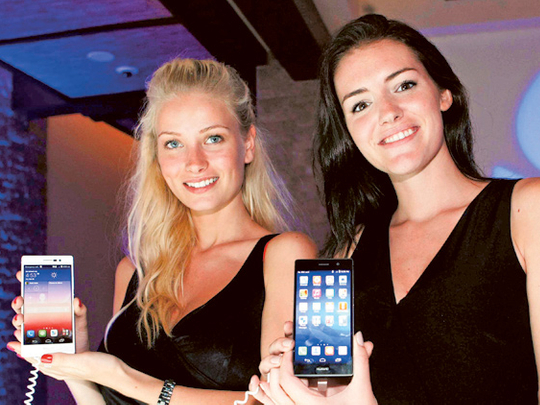
Dubai: Huawei, world’s third largest smartphone manufacturer, is keen to continue pushing the boundaries of what is possible to gain more market share.
“We have grown more than 60 per cent year on year globally. We doubled our numbers across the region. Our strategy, right from the beginning, was to offer the right value to the end users. We don’t want the end users to pay for nothing,” Ashraf Fawakherji, vice-president of Huawei Device Middle East, told Gulf News after unveiling its five-inch Ascend P7 smartphone in Dubai on Wednesday evening.
The Chinese manufacturer sold 48.8 million smartphones out of its total phone sales of 55.5 million with a market share of 4.9 per cent worldwide.
In the UAE, the second-ranked Huawei had a market share of around 14.9 per cent in the first quarter of this year in the smartphone segment after Samsung.
Building on the success of its predecessor — Ascend P6 — Fawakherji said that Huawei has added an array of innovative features to P7 in a new design for Dh1,699.
“We are a new player in the market. We have sold four million P6 units in less than one year.
“We are confident that regional consumers will react well to the introduction of the Ascend P7 because of the host of incredible software and design features that are included in the device and double our sales volume,” he said.
Global smartphone sales accounted for 87 per cent of Huawei’s shipments last year, a jump from 60 per cent in 2012.
Fawakherji said that Huawei has exited the voice-only (feature) phones segment due to lack of margins and weak growth. “We will focus only on mid- and high-end smartphones,” he said.
The company expects to sell 80 million smartphones this year but it faces a crowded group of potential competitors within striking distance, especially LG and Lenovo.
Nabila Popal, senior research manager at International Data Corporation (IDC), said that it is a player to watch out for in the Middle East and Africa. Huawei is growing quarter on quarter and year on year.
“Huawei and Lenovo captured the market shares lost by big players last year,” she said.
To fuel growth and margins, Huawei is using its own processors in its phones and following Samsung’s footsteps.
Last year, Huawei spend more than $4 billion (Dh14.7 billion) on research and development, according to Fawakherji said. “We have to come out with our own solutions and innovations to stay at [the] forefront, and we are not following anyone,” he said.
On teleom operator business, he said that operator business contributes around 10 per cent of the total sales in the UAE
“Europe has subsidised [the] smartphone business a long time ago. In the Middle East, some countries are on track. Last year, etisalat offered subsidies for P6. Saudi Arabia, Kuwait and Bahrain are offering subsidies in the Gulf,” he said.
It takes “time to change the market nature.”
“Some people don’t believe in long-term commitments. They want to change the devices often and don’t prefer to get stuck with contracts with the operators,” he added.










